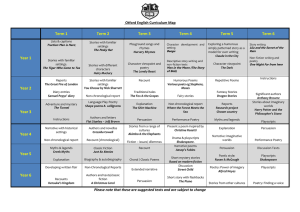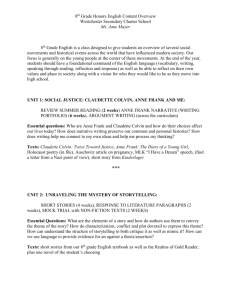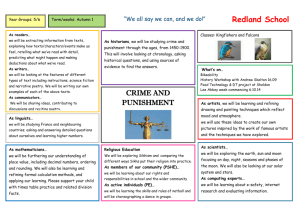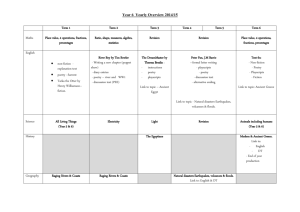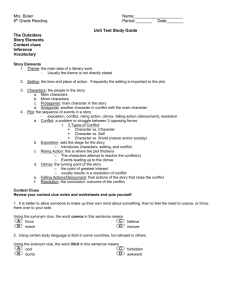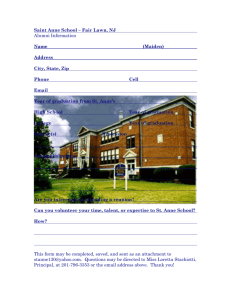Terrific Texts Year 4 - Wibsey Primary School
advertisement
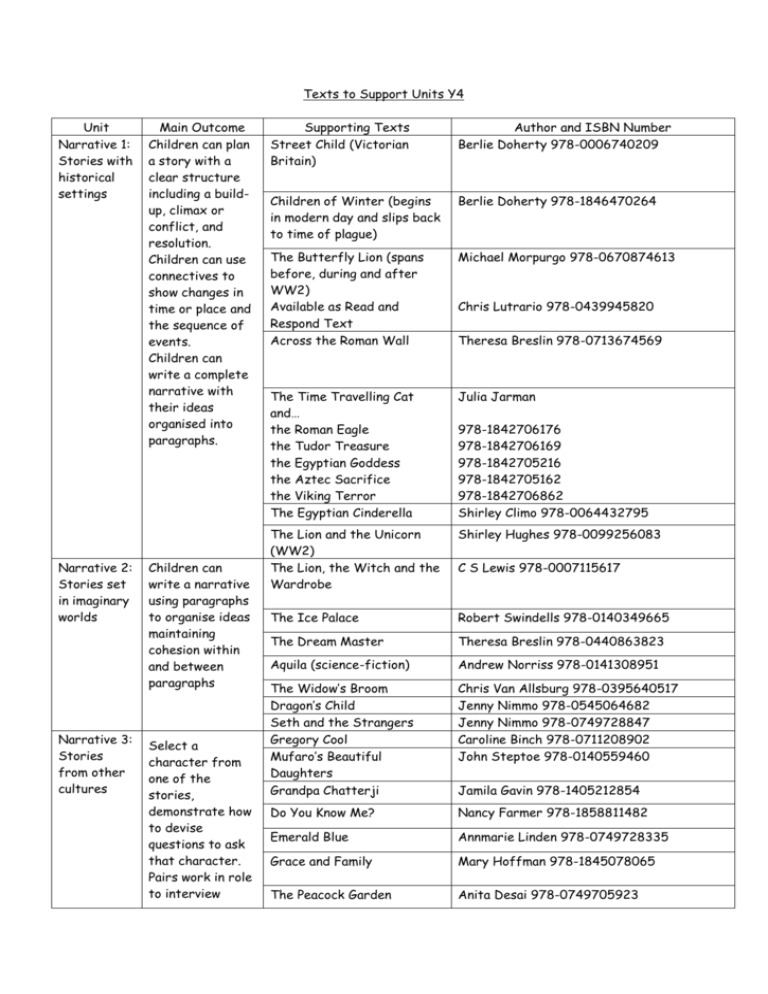
Texts to Support Units Y4 Unit Narrative 1: Stories with historical settings Narrative 2: Stories set in imaginary worlds Narrative 3: Stories from other cultures Main Outcome Children can plan a story with a clear structure including a buildup, climax or conflict, and resolution. Children can use connectives to show changes in time or place and the sequence of events. Children can write a complete narrative with their ideas organised into paragraphs. Children can write a narrative using paragraphs to organise ideas maintaining cohesion within and between paragraphs Select a character from one of the stories, demonstrate how to devise questions to ask that character. Pairs work in role to interview Supporting Texts Street Child (Victorian Britain) Author and ISBN Number Berlie Doherty 978-0006740209 Children of Winter (begins in modern day and slips back to time of plague) Berlie Doherty 978-1846470264 The Butterfly Lion (spans before, during and after WW2) Available as Read and Respond Text Across the Roman Wall Michael Morpurgo 978-0670874613 The Time Travelling Cat and… the Roman Eagle the Tudor Treasure the Egyptian Goddess the Aztec Sacrifice the Viking Terror The Egyptian Cinderella Julia Jarman The Lion and the Unicorn (WW2) The Lion, the Witch and the Wardrobe Shirley Hughes 978-0099256083 The Ice Palace Robert Swindells 978-0140349665 The Dream Master Theresa Breslin 978-0440863823 Aquila (science-fiction) Andrew Norriss 978-0141308951 The Widow’s Broom Dragon’s Child Seth and the Strangers Gregory Cool Mufaro’s Beautiful Daughters Grandpa Chatterji Chris Van Allsburg 978-0395640517 Jenny Nimmo 978-0545064682 Jenny Nimmo 978-0749728847 Caroline Binch 978-0711208902 John Steptoe 978-0140559460 Do You Know Me? Nancy Farmer 978-1858811482 Emerald Blue Annmarie Linden 978-0749728335 Grace and Family Mary Hoffman 978-1845078065 The Peacock Garden Anita Desai 978-0749705923 Chris Lutrario 978-0439945820 Theresa Breslin 978-0713674569 978-1842706176 978-1842706169 978-1842705216 978-1842705162 978-1842706862 Shirley Climo 978-0064432795 C S Lewis 978-0007115617 Jamila Gavin 978-1405212854 characters. Narrative 4: Stories that raise issues/dilem mas Narrative 5: Plays Nonnarrative 1: Recounts: newspapers/ magazines Children write in role as a character from a story, advising the main character about what they should do; Children plan and write their own stories from a given setting and dilemma Improvise dialogue between key characters and use this as the basis for writing own short playscripts. Children can plan, draft and publish a newspaper article using the appropriate language and presentational features. Bill’s New Frock (gender stereotypes) The Angel of Nitshill Road (bullying) The Chicken Gave It To Me (animal/farming issues) The Widow’s Broom (prejudice - being different/misunderstood) Where the Forest Meets the Sea (environmental issues) Way Home (homelessness) Prosper’s Mountain (prejudice - being different/misunderstood) Secret Friends (bullying/peer pressure) Some of Anne Fine’s novels have been issued as playscripts including: Bill’s New Frock Celebrity Chicken (The Chicken Gave It To Me) The Angel of Nitshill Road Time Switch Let’s Go To London (2 playscripts set in Tudor times) Range of real newspapers/magazines Also Walker and Usborne produce a whole range of newspaper style books based on periods in history - an example of each is given here: Anne Fine 978-1405233187 Anne Fine 978-1405233200 Anne Fine 978-1405233217 Chris Van Allsburg 978-0395640517 Jeannie Baker 978-0744513059 Libby Hathorn 978-1842702321 Henrietta Branford978-0091766368 Elizabeth Laird 978-0340664735 Anne Fine 978-0582095564 Anne Fine 0-582-12248-1 Anne Fine 978-0602284503 White Wolves Playscripts 978-0713681352 Kaye Umansky (White Wolves Playscripts ) 978-0713681512 The Greek News (Walker) Anton Powell and Philip Steele 9780744544756 The Egyptian Echo (Usborne) Paul Dowswell 978-0746027516 Nonnarrative 2: Information texts Nonnarrative 3: Explanation Nonnarrative 4: Poetry 1: Creating Images Present information from a variety of sources in one simple format Children can write an explanation text using the conventions of the text-type. Children can write a persuasive voiceover text using informal language and a range of simple connectives. Children can write their own simple poem based on one previously read and analysed. Children can paint a vivid word picture using similes and other simple images. Information texts that link with other areas of the curriculum Explanation texts that link with other areas of the curriculum The Shirt Machine PNS Visual Text - look under Y4 - unit 3 resources Until I met Dudley Roger McGough 978-0711211292 Big Blue Whale Nicola Davies 978-0763610807 Understanding Your Muscles and Bones Rebecca Treays 978-0794508135 An excellent website that offers explanations for how a huge variety of everyday objects/processes work Another website that offers diagrams and short explanations for inventions children could use these as basis for further explanation Examples from everyday life such as advertisements, circulars, flyers, leaflets and articles on topical issues http://www.howstuffworks.com/ Stand Up for Your Rights Peace Child International 978-1854345738 Stand Up, Speak Out Peace Child International 978-1854348876 Viewpoints On Waste (Magic Bean) Also available as big book The Works KS2 Rodney Martin 978-1863740531 Paint Me a Poem (Poems based on paintings and sculptures in Tate Gallery - virtual tour of gallery available) The Works 2 - Poems on Every Subject and for Every Occasion Grace Nichols 978-0713666489 Poetry anthologies http://totallyabsurd.com/absurd.htm 978-1863740524 Chosen by Pie Corbett 978-0330439497 http://www.tate.org.uk/britain/explore/etb. jsp Chosen by Brian Moses and Pie Corbett 978-0330399029 Poetry 2: Exploring Form Children can plan, organise and create an ICTbased poetry presentation that involves each member of the group ‘The Works’ Range See above The Poetry Store Edited by Paul Cookson 978-0340893869
